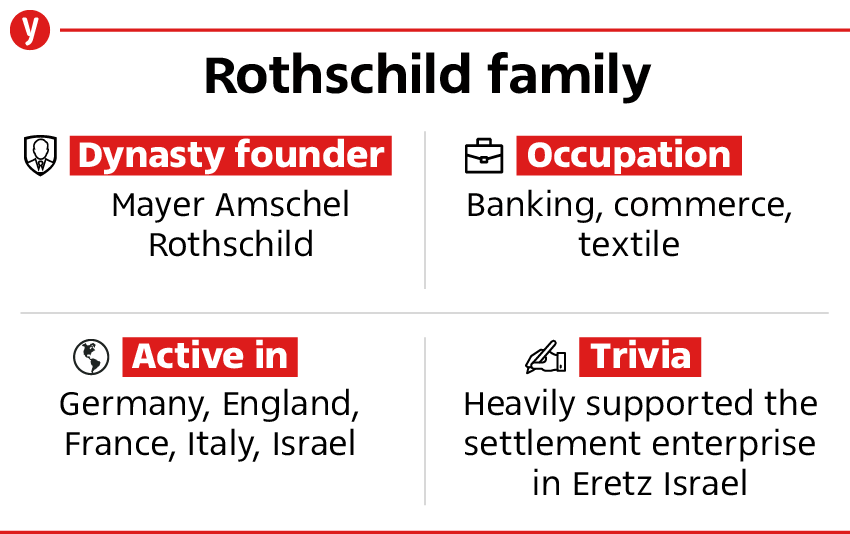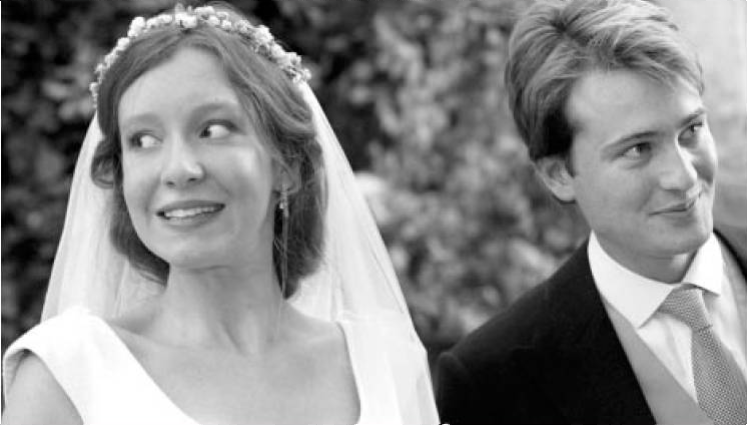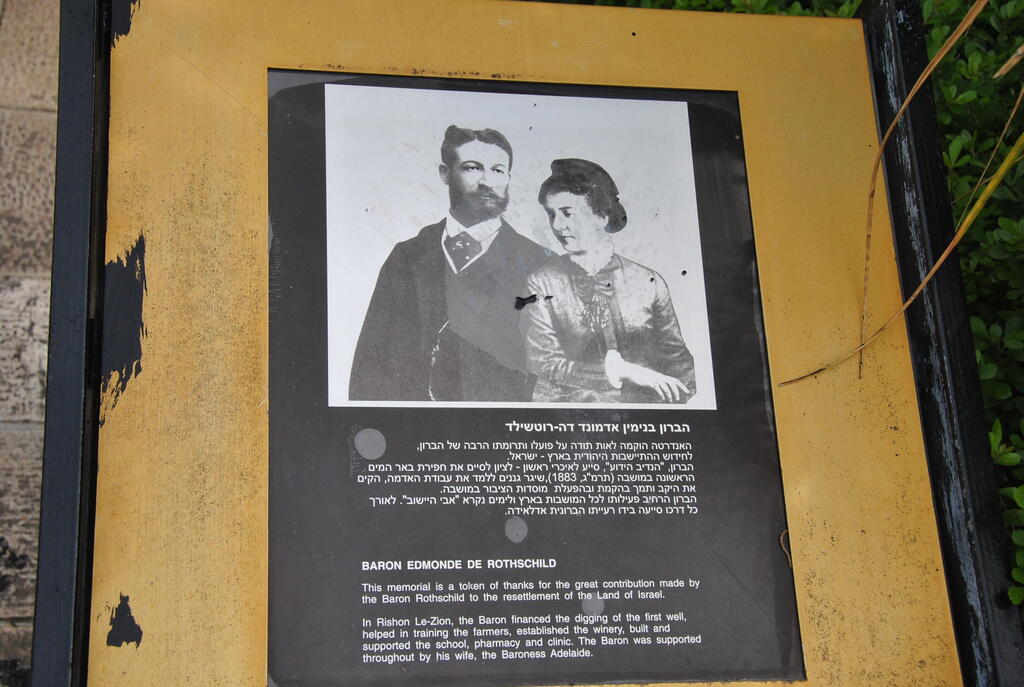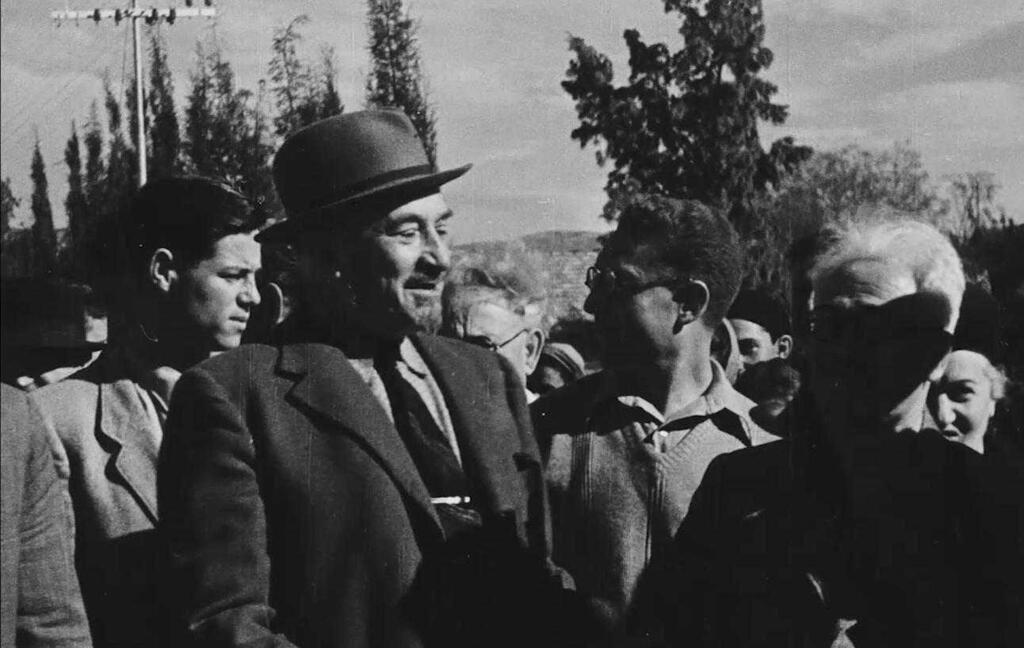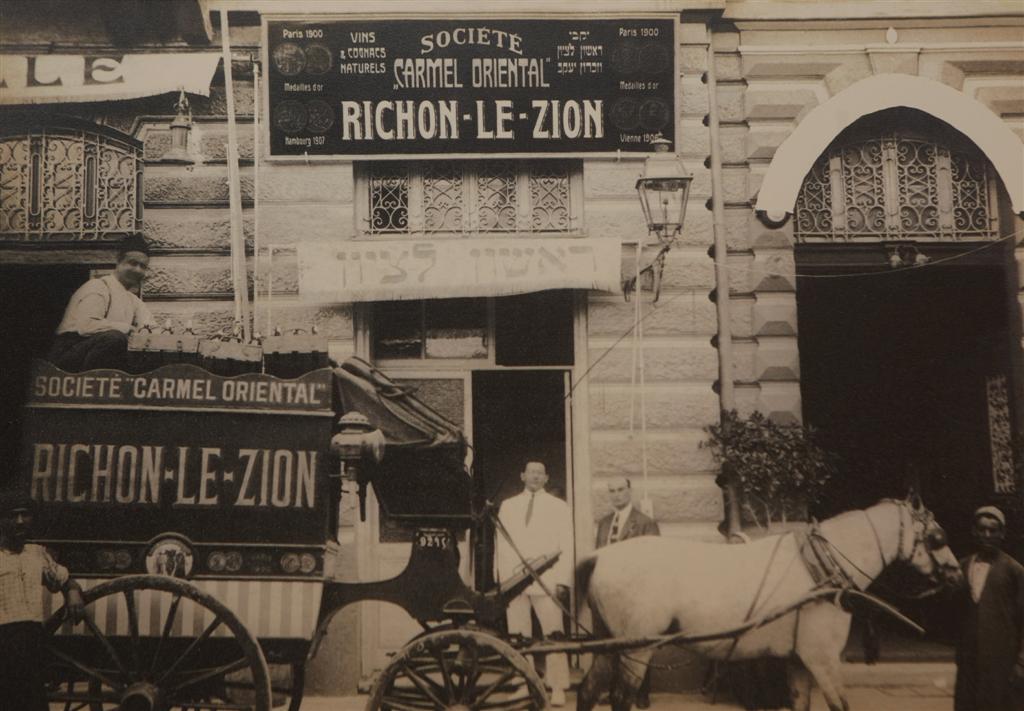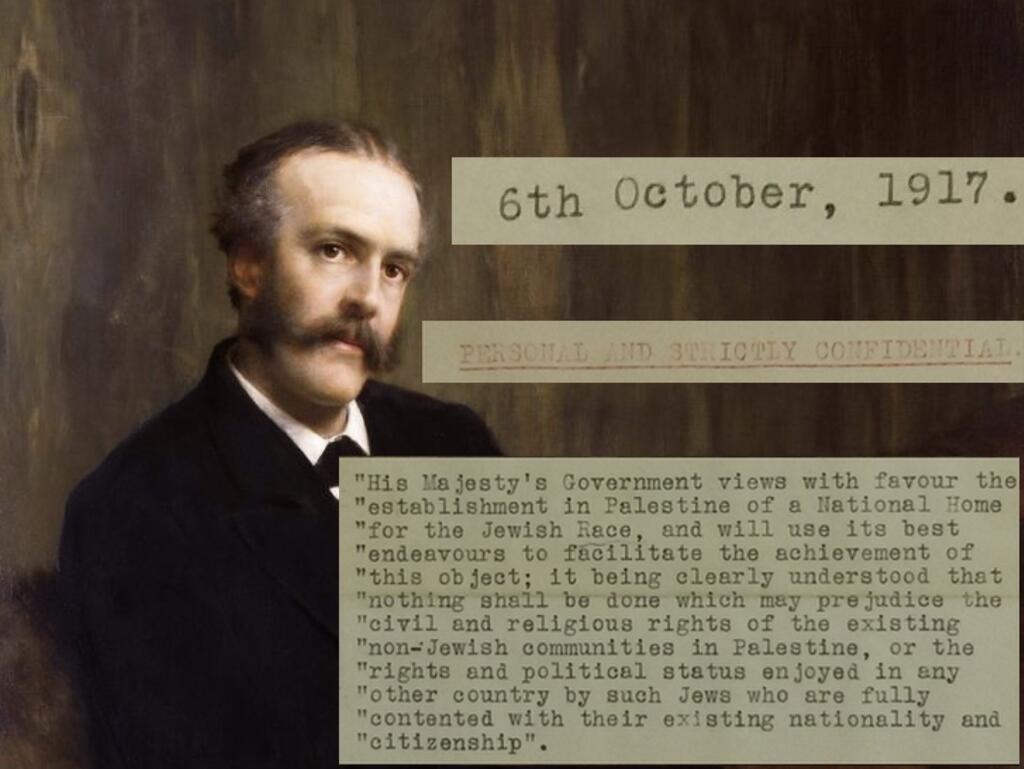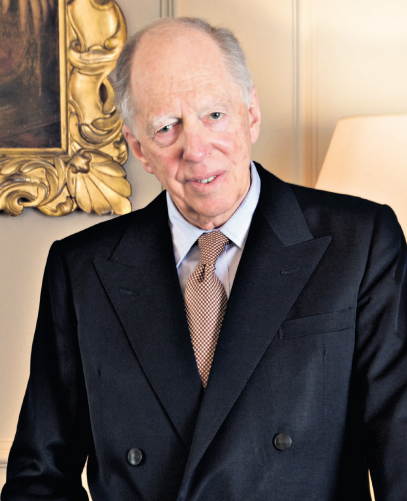While there was never any shortage of obscenely-wealthy Jewish families over the years, none had amassed this combination of influence, power, fame and money quite the same way as the Rothschilds. Their name actually became synonymous with success, wealth and Jewish influence.

History professor Danny Gottwein of Haifa University says their glorification stems not only from their immense contribution to Jewish populations, but also the political clout they possessed up until the end of the Frst World War.
This, in turn, led to the Balfour Declaration, a public statement issued by the British government in 1917 during the First World War announcing its support for the establishment of a "national home for the Jewish people" in Palestine.
8 View gallery
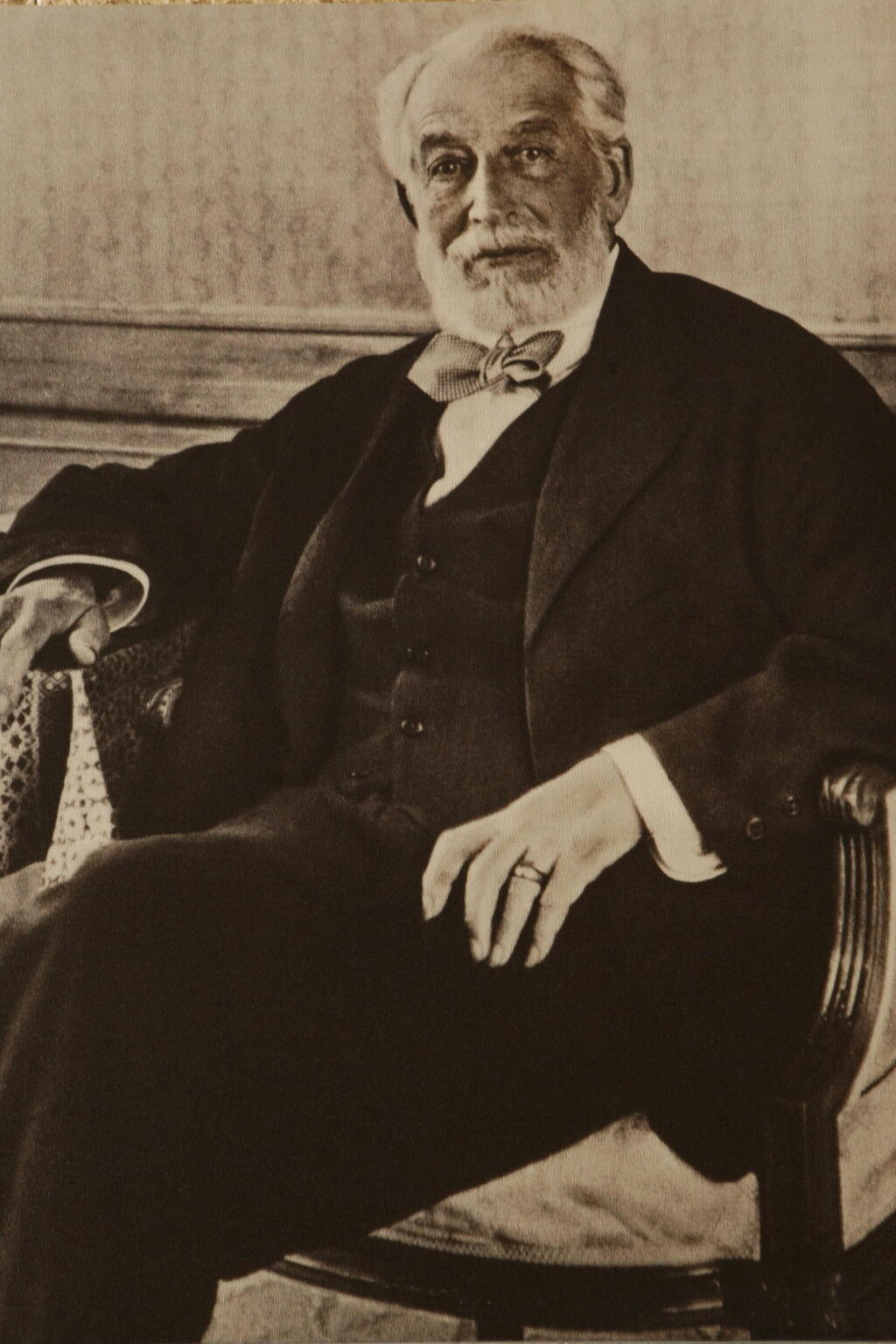

Baron Edmond James de Rothschild - a major contributor to the establishment of the State of Israel
(Photo: Elad Gernstein)
Even if you've never had the chance of seeing Fiddler on the Roof, a musical set in the Pale of Settlement of Imperial Russia in or around 1905, it's more than likely you can hum the tune of "If I Were a Rothschild", a song by Sholem Aleichem.
In the musical, Tuvya dreams of being as rich as a Rothschild. "Back in the 19th century, the Rothschilds developed a business strategy," says Prof. Gottwein, "which propelled them to untold global political influence, coinciding with the industrial revolution."
Issuing bonds between countries
It all started with Mayer Amschel Rothschild, born in February 1744 in the Judengasse, the Jewish ghetto of Frankfurt, Holy Roman Empire, located in present-day Germany. He was one of eight children.
Amschel's father had a business in goods trading and currency exchange. He was a personal supplier of coins to the prince of Hesse.
As to what was the exact cause of his meteoric rise, Gottwein says Mayer correctly analyzed the European financial turmoil of the early 19th century. The industrial revolution, while creating a massive demand for goods, had no organized market to serve it.
The Rothschilds created a reliable financial system in both London and Paris. Once the Napoleonic wars were concluded, they leveraged those markets and answered aggregate demand by becoming the premier source of issuing bonds between the countries.
"The family employed astute and ingenious commercial tactics ahead of their time," says Gottwein. "All the while exhibiting intricate communication skills and a keen grasp of the political landscape and pricing dynamics for global financial intermediation. Furthermore, they ventured into industries characterized by inherent monopolies and funded enterprising endeavors in the realms of transportation, oil, and railways."
Smuggling English goods into Europe
Moran Gal-On, a history professor that is concluding his work on the Rothschilds, said: "Whilst giving due respect to Mayer for establishing the Rothschild dynasty, it is Nathan, his enterprising son, who truly deserves the laurels. It was he who elevated the Rothschilds from being mere textile traders to becoming an unparalleled empire of worldwide renown.
"Nathan's shrewd investment in the London Stock Exchange and his ingenious smuggling of English goods into Europe during Napoleon's embargo on England were masterful moves. He deployed his brothers James, Salomon, and Amschel to strategic locations such as Paris, Vienna, and Frankfurt, respectively, to supervise the smuggling operations.
"Even his son Karl was sent to Italy, where he lent money to the Kingdom of the Two Sicilies, the largest Italian kingdom before the national unification in 1861. Post-unification, Nathan's sons returned to Frankfurt, where Meir Karl and Wilhelm Karl deftly ran the German branch of the Rothschild Bank."
It's worth noting that among the prominent Rothschild family members, Wilhelm-Karl stood out for his religious observance, which was not very common among his relatives
It's worth noting that among the prominent Rothschild family members, Wilhelm-Karl (also known as "Shimon Ze'ev the righteous") stood out for his religious observance, which was not very common among his relatives.
In fact, he played a significant role in aiding the Jewish community in Eretz Israel, following in the footsteps of his uncle James, who was the first Rothschild family member to assist the Jews of Jerusalem and establish the Meir Rothschild Hospital.
Only little interest in Zionism
In 1857, Wilhelm-Karl founded the Rothschild House in Bei Mahsa Square, and he also participated in the financing of the "Committee for the Establishment of Bikur Holim Hospital". Interestingly, his daughter Adelaide married Baron Edmond James de Rothschild, who was later renowned as "the father of the settlement" and a well-known benefactor.
In the pursuit of knowledge, Gal-On's doctoral thesis led him to delve into the archives of the illustrious Rothschild family, where he uncovered a surprising truth. Contrary to popular belief, the majority of family members had little interest in Zionism, and the British bank of the Rothschilds was more concerned with profit-driven investments rather than the development of Eretz Israel.
Contrary to popular belief, the majority of family members had little interest in Zionism, and the British bank of the Rothschilds was more concerned with profit-driven investments rather than the development of Eretz Israel
However, amid this revelation, a shining beacon of hope emerged in the form of Edmond, the son of James from Paris. With his abundant riches and a free schedule, he dedicated his time and resources to assisting Jewish immigrants who flocked to Eretz Israel.
Vision for Israel's vineyards
In 1882, the first Aliyah commenced. A time when over 25,000 Jews voyaged to the promised land, hailing from the far reaches of Eastern Europe. Among them was Shlomo Goldman, an esteemed ancestor of Moran Gal-On, who went on to co-found the Rosh Pina settlement.
However, as fate would have it, the first colonies, including the likes of Rishon Lezion, Zichron Ya'akov, Yesod Ha'Maale and Petah Tikva, soon found themselves facing significant financial hardships. Desperate times called for desperate measures, so they sent forth emissaries to beseech Edmond for his aid.
"He was a man of many talents, a sportsman and a collector of fine art, but also a man in search of a purpose," recounts Gal-On with a grin. "However, the baron found his calling when he decided to throw his support behind the struggling colonies in Israel. It all started with funding a well in Rishon Lezion, but soon he was buying land and financing officials for other colonies.
"His goal was to demonstrate to Jews worldwide that they too could cultivate the land in Israel. While not all of his initiatives were successful (producing perfumes and raising silkworms come to mind) the wineries he established were a resounding triumph. And with the family's renowned Chateau Lafitte winery in Bordeaux as inspiration, the baron's vision for Israel's vineyards took root."
the family's influence subsided
The Rothschilds' power began to decline in the late 19th century due to changes in the global economy, which harmed their relative advantage. After World War I, the rise of fascism and Nazism further eroded their power.
With the United States becoming an economic superpower after World War II, the Rothschilds gradually lost their political power and became investment houses. Today, their reputations still rest on ancient laurels.
With the United States becoming an economic superpower after World War II, the Rothschilds gradually lost their political power and became investment houses
Gal-On highlights consanguineous marriages within the Rothschild family as a contributing factor to the family's decline. "At the beginning of the 20th century, the family's influence subsided. While financial geniuses like Nathan and Lionel emerged, others focused on the arts or philanthropy.
Nathaniel, who succeeded Lionel as head of the bank, passed in 1915. Charles had mental health issues, leaving Anthony, the son of Leopold, to manage the family bank in Great Britain."
Seemingly invincible
Prof. Gottwein explains that the Rothschilds' ability to avoid expropriation was due to their creation of a stratified power structure, their risk management skills, and their coordination as an international network.
They also challenged the political elites and aristocracy in their countries of residence, gradually becoming part of the British aristocracy and entering politics within the Liberal Party. They even helped in the purchase of shares in the Suez Canal, and were behind the repeal of the ban on Jews being members of Parliament.
Gottwein, a scholar of Jewish nationalism and antisemitism, refutes the notion that the success of the Rothschilds contributed to the rise of antisemitism. He argues that, according to Herzl's interpretation, antisemitism was a product of the crises in European society at the turn of the 20th century, and it was aimed mainly at the Jewish bourgeoisie.
Antisemitic groups exploited the struggle against the Jewish bourgeoisie as a way to oppose the bourgeoisie in general, which the socialists, their opponents, demanded. Furthermore, they used the Rothschilds as a symbol of exploitative Jewish capital to legitimize their anti-Semitic beliefs.
Antisemitic groups used the Rothschilds as a symbol of exploitative Jewish capital to legitimize their anti-Semitic beliefs
According to Prof. Gottwein, the role of Chaim Weizmann in the Balfour Declaration was overstated in Israeli education and popular culture. Instead, he suggests that the strategy leading to the declaration was devised by Baron Edmond de Rothschild and Weizmann was dependent on the connections and power of the Rothschild family.
The strategy involved the conquest and dissolution of the Ottoman Empire and the establishment of a British colonial territory in the Land of Israel, where a national home for the Jews would be created. Weizmann played a role in implementing the strategy during the war with the help of members of the English branch of the Rothschild family.
While it is true that the Rothschilds had different attitudes towards Zionism, it is important to note that they were not a monolithic entity with a single stance on the issue. Some members of the family were indeed early supporters of Zionism, while others were opposed to it or indifferent.
The family's involvement in the Zionist movement was also complex and multifaceted, ranging from financial support to political influence and manipulation. The Rothschilds, like many other wealthy and influential families, were primarily motivated by their own interests and goals, which could sometimes conflict with those of the Zionist movement or the Jewish people as a whole.
Lord Lionel Walter Rothschild, who was the recipient of the Balfour Declaration, was known for his eccentricities and his passion for zoology. He owned a private museum of natural history that included not only a vast collection of stuffed birds, but also live animals such as kangaroos and zebras, which he kept on his estate in Tring, Hertfordshire. He was also a member of Parliament and a supporter of the Zionist movement.
Gal-On recounts a tale of dashing intrigue and political maneuvering, revealing the unsung hero behind the historic Balfour Declaration. None other than James-Armand, the son of Baron Edmond Rothschild, was the driving force behind the British government's approval of a Jewish national home in Palestine.
Despite his French heritage, James-Armand immigrated to Britain after the notorious Dreyfus affair and quickly rose to prominence as the liaison officer for Hebrew regiments during World War I.
With his effortless charm and political acumen, he even managed to woo a 17-year-old Dorothy-Devorah Pinto into marriage at the age of 35, before eventually securing a coveted seat in Parliament. A true master of strategy and persuasion, James-Armand Rothschild played a crucial role in the establishment of Israel and the fulfillment of the Zionist vision.
The winery - a testament to his vision and foresight
During the 1920s, Baron Rothschild directed his investments towards grandiose national projects in Palestine. These included the Naharim Rotenberg power plant, factories located near the Dead Sea, a salt factory in Atlit, large flour mills in Haifa, the famous Goldstar breweries in Rishon Lezion, and the establishment of a winery in Rishon Lezion.
His investments in these ventures were a testament to his vision and foresight, as they contributed greatly to the development of the local economy and infrastructure.
The Great Depression of 1929 took its toll, and the family's French and Austrian branches were particularly hard hit during World War II. In addition, the Jewish Agency began attracting significant donations
The Rothschild family faced several challenges that led to a weakening of their power later on. The Great Depression of 1929 took its toll, and the family's French and Austrian branches were particularly hard hit during World War II. In addition, the Jewish Agency began attracting significant donations, which reduced the Rothschilds' influence.
As the State of Israel was established, the family transferred part of its assets to the state, and in 1957, they gave away everything that remained, which included a total of 350,000 acres of land. However, before this happened, James-Armand Rothschild established the Ramat Hanadiv Gardens as a final resting place for his parents' remains.
The father of the settlement movement
Although only a portion of the Rothschild family contributed to the establishment of the State of Israel, their impact was significant. While it cannot be claimed that the country would not have been established without them, their support certainly accelerated its development.
Indeed, it is likely true to say that Baron Edmond Rothschild played a key role in the establishment of Jewish settlements in Palestine and can be considered the father of the settlement movement.
According to Gal-On, there exist several other financial entities which are owned by segments of the Rothschild family. Among them is the Rothschild Investment Trust, established in the 1980s by the esteemed British financier Jacob Rothschild.
Its estimated value stands at a whopping 100 billion pounds, an impressive figure by all accounts. Jacob Rothschild, who also served as president of Yad Handiv, was replaced by his successful British author daughter, Hannah, as president of the foundation.
Prefer to keep a low profile
If you're looking for Rothschilds with extravagant lifestyles, you might be out of luck. Many members of the current generation, prefer to keep a low profile, enjoying their wealth at comfortable discretion without making a big fuss.
But there's always an exception to the rule, and that's the late Rabbi Elinatan Rothschild. He was from the Swiss branch of the family, but he made his way to Israel, settling in Jerusalem and making an impact until his passing in 2017. Now his daughter, Rabbi Yamima Mizrahi, has taken up the mantle, becoming one of the most influential figures for women in the religious and ultra-Orthodox sectors.
So while the Rothschilds might not always be in the limelight, they're still making their mark in their own unique way.



